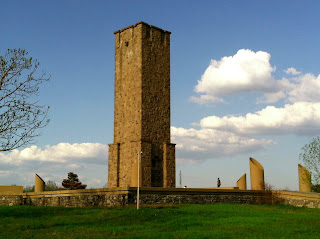 |
| Azerbaijan with Capital of Baku on the Caspian Sea |
I have just completed a very enjoyable week in Baku, Azerbaijan, a
well-off former soviet republic which has both oil and natural gas. On Saturday
afternoon an Azeri colleague and her family gave me a personal tour of Baku's
beautiful old city which stems from the 13th Century. The government has
also created a very nice harbor area with a long promenade, excellent local and
international restaurants and playgrounds for the children which are heavily
frequented by the citizenry in the evenings and on weekends.
Below are some pictures and links related to Baku and Azerbaijan:
 |
| Baku - Old City Wal |
After my tour of Baku's Old
City, my guides drove me to a small village on the banks of the Caspian Sea
where we had a wonderful fish dinner. While the Caspian is quite polluted
near the shores where most of the oil rigs are, it is much less so in the
middle where the fish are caught.
After dinner we returned to
Baku and walked through a memorial park that looks down over the harbor. This
area contains three very modern high rise buildings that locals call the
"Flame Towers." They are lit at night with constantly changing patterns
including bright flames which makes it appear as if they are on fire. I
was mesmerized by them every evening from my room at the Marriott. Below is a
youtube video link on the Flame Towers followed by a couple of personal photos:
 |
| View from Marriott Hotel Room: Flame towers in blue, Hilton hotel in foreground with stripes |
 |
| Baku's eternal flame (as long as the gas doesn't run out) |
 |
| Flame Towers and Harbor from Marriott during the day |
While in Baku I have had many discussions about
religion and especially Islam. One Azeri laughingly said that one of the
advantages of having been under the old Soviet system was that religious Islam
was suppressed by the Russians and that the people are much better off as a
result. Most are very happy that there is no state religion or talk of
Sharia in Azerbaijan and that Islam doesn't completely dominate all aspects of
their lives like it does in many Arab countries.
I have really enjoyed the very tolerant Muslim culture in Baku.
Most Azeris are Shia Muslim who follow most of the colorful Muslim
traditions, but do so without the fanaticism often experienced in the Middle
East. I have only seen a couple of women with covered faces and
only a small percentage of women have even their hair covered. Few Azeris
go to the mosque on Fridays even though there are several beautiful ones in
Baku. The call to prayer, often shrill in other countries, is toned down and
only comes from a limited number of minarets. When it comes to enjoying a
glass of beer or wine in public, Baku is more liberal than my home town of
Salt Lake City. It is more like the wonderful beer gardens of Germany. Below is an interesting article on Azerbaijan's secular version of Islam.
|






































